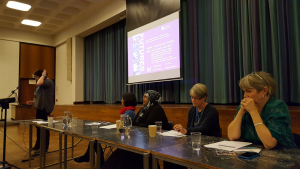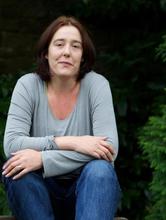Dr Emma Williamson shares her reflections on the recent Thinking Futures event at the University of Bristol, which debated what justice means for victims of gender based violence.
What does justice look like? This was the question asked at last week’s Thinking Futures event run by the Centre for Gender and Violence Research at the University of Bristol. The event was part of the wider Thinking Futures programme which celebrates research from the University’s Faculty of Social Science and Law, and supports the national ESRCs Festival of Social Sciences.
We chose the topic of Gender, Violence and Justice as it coincides with current research looking at Justice, Inequalities, and Gender Based Violence being conducted in partnership with Women’s Aid, England, and Welsh Women’s Aid.
The event, held at the Church Above The Shops, was introduced by Thangam Debbonaire, MP for Bristol West. Thangam brought to the evening her experience of working with the perpetrators of abuse, whether individuals or collective within processes and systems. She reminded us of the need to challenge and change those behaviours and the ideas from which they come. Thangam also recognised the long and on-going history in Bristol of women fighting gender based violence, from the early Women’s Aid movement, to Rape Crisis, to Integrate – all of whom were represented on the evening.
Geetanjali Gangoli, from the Centre for Gender and Violence Research was first to speak, highlighting findings from a recent study conducted for Her Majesty’s Inspectorate of the Constabulary (HMIC) on so called ‘honour violence’. Geetanjali highlighted the barriers faced by Black and Minority Ethnic Women when trying to challenge abuse which might be categorised as honour based. She recognised that for some of the women in the research other relatives, including male relatives, were sometimes the ones to encourage victims/survivors to seek justice through the police and official systems. Geetanjali also discussed the difficulty of challenging abuse which might be condoned by families and communities, and the importance therefore of thinking about what justice means in wider and community based context.
Layla Ismail was next on the podium, both in her capacity as director of Refugee Women Bristol, and in her role for FORWARD, the national charity concerned, for many years, with the issue of Female Genital Mutilation (FGM) or ‘cutting’. Again, the importance of community justice was raised. – To stop this particular abuse, adult survivors of FGM should be given the space to talk about their experience and the impacts it had had, in the hope that it would be a catalyst for social change. Young women in Bristol, supported by FORWARD, have been at the forefront of work on this issue nationally, and it was a pleasure to hear about their success in changing attitudes. In terms of our initial question, what does justice look like, justice here looks like no more FGM/cutting.
As well as inspiring the audience, Layla also challenged the multiple and sometimes contradictory oppressions which women might face. In this case the abhorrence society directs to FGM whilst condoning within popular media similar plastic surgery procedures. These contradictions do not go unnoticed within those populations where FGM has been an issue.
Following Layla was Rowen Miller from SARSAS – Somerset and Avon, Rape and Sexual Assault Service. Rowen was talking about sexual violence and justice, and what it feels like, from a survivor’s perspective to walk into a court of law, to take steps to seek formal types of justice. For most it feels like walking into the lion’s den. Rowen highlighted the importance of empowering survivors following assault to make they own decisions about how they wish to proceed, and the systems they have put in place to assist with this, including acting as a go-between for survivors who might want to report anonymously and the police. As with all of the speakers, Rowen offered us hope about the growth which is possible for survivors following experiences of gender based violence, and the importance of supporting, standing alongside and behind, survivors to their sources of justice, whatever that is.
The final panel speaker of the evening was Marianne Hester. Marianne focused more on domestic violence as one part of the wider gender based violence continuum. She highlighted the failures of formal justice to offer ‘justice’ in the sense of convictions for crimes, and discussed the alternatives we might then wish to explore. If formal justice on a population level, on the whole, doesn’t work for victims/survivors then what are the alternative available to us?
Following the panel presentations, the chair opened up the discussion to the audience. Initially reluctant, understandably, the audience come forward with a wide range of ideas about what justice might look like: rough justice, social justice – social change, restorative justice – in its true and safe form, empowerment, and resistance. As well as people’s experience of working in the field of gender based violence, people also talked about their experiences of abuse and the formal justice system.
We would like to thank all of the audience members for creating a safe space and atmosphere where survivors felt able to speak, and to those speakers for sharing their experiences with us. Injustice was not being able to face the perpetrator, in court, and tell him what he did. Injustice is over five years fighting a perpetrator who twists the system to drag you, as a victim/survivor, through the courts repeatedly. Injustice is being told by a therapist that if you choose to report an incident to the police then you cannot continue to receive their help.
So, taking the injustices which unfortunately inform our ideas of what justice might look like, for this group justice was about a wider recognition of gender, and other, inequalities. It is recognising misogyny as a form of gendered hate crime, and of finding new ways to challenge it. It is challenging schools to implement relationship and respect education – despite the government not making it mandatory. It is fighting for the support services needed to allow victims/survivors to seek the help they need, and to stand alongside them in their struggles to stop it happening in the future to others. Above all justice was what victims/survivors think it should be.
In a week when the US elected a president who admitted sexually groping women without asking (many would call that sexual assault) – justice is living in a society that says that is not okay and stands together to change it.
For further information about the Centre for Gender and Violence Research: http://www.bristol.ac.uk/sps/research/centres/genderviolence/
Anyone interested in talking to the research team about experiences of abuse, as part of the Justice Project, please contact us via the project page or email: sps-justiceproject@bristol.ac.uk
 attern is consistent with prevailing gender power relations, which, broadly speaking, have privileged masculine interests. Accordingly, English prostitution policy has traditionally focused on ‘managing women’ – from the Contagious Diseases Acts (1864–1869) through to the use of Anti-Social Behaviour Orders against street sex workers since the early 2000s. Concern for public decency has also brought visible buyers – kerb-crawlers – in to the legal spotlight.
attern is consistent with prevailing gender power relations, which, broadly speaking, have privileged masculine interests. Accordingly, English prostitution policy has traditionally focused on ‘managing women’ – from the Contagious Diseases Acts (1864–1869) through to the use of Anti-Social Behaviour Orders against street sex workers since the early 2000s. Concern for public decency has also brought visible buyers – kerb-crawlers – in to the legal spotlight.


